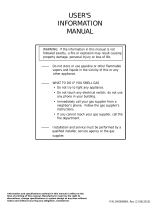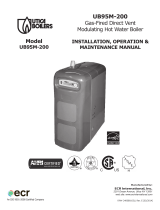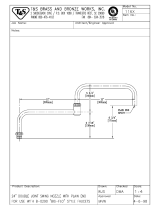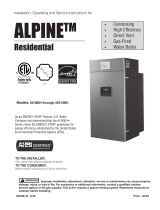Page is loading ...

WALL MOUNTED
GAS BOILER
INSTALLATION, OPERATION &
MAINTENANCE MANUAL
An ISO 9001-2008 Certified Company
P/N# 240008888, Rev. L [11/2013]
Models
DK VLT-050
DK VLT-075
DK VLT-100
DK VLT-150
DK VLT-200
DK VLT-299
Manufactured by:
ECR International, Inc.
2201 Dwyer Avenue, Utica NY 13501
web site: www.ecrinternational.com
050/075/100/150/200
SIZE SHOWN

2
Description
Item
No. Illustration
Fully Assembled Boiler 1
Metal Wall Bracket 2
Lag Bolt, 3/8" x 3" Hex (4 ea) 3
*Safety Relief Valve 4
3/4" Tee 5
3/4" Nipple 6
3/4" x 1/4" Elbow 7
Air Vent 8
**Temperature Pressure Gauge 9
Bushing 3/4" x 1/4" 10
3/4" Tee (Same as No. 11) 11
Nipple 1¼ x 5½ 12
Drain Valve, 3/4" 13
3/4" Tee 14
Nipple 1¼ x 5½ 15
Bushing 7/8" OD, Heyco (2 ea) 16
Used for electrical wire knockouts.
Stopper, Rubber 5/16" (2 ea) 17 Used for packaging holes on back of boiler.
Plastic Plug (2 ea) 18 Used for packaging holes on back of boiler.
Outdoor Sensor 19 Used for measuring outside temperature.
Critical Installation Instruction 20 11" x 17" Page for critical installation issues.
Document Package 21 Includes essential documents.
4
5
6
7
8
2
3
9
10
12
13
14
11
15
299 SIZE
SHOWN
VERIFY CONTENTS RECEIVED
* Boiler provided with 30 psig (206 kpa) safety relief valve. Field source safety relief valve if system pressure
greater than 25 psig.
** Boiler provided with 75 psig temperature pressure gauge. Field source temperature pressure gauge if system
pressure greater than 60 psig.

3
(C)
DIMENSIONS
FIGURE 1-1 Dimensions
(D)
Wall Hanging
Bracket
(D)
(A)
(E)
Vent Connector
Combustion Air
Safety Relief
Valve
Connection
(¾ NPT)
(B)
Condensate Drain Connection (L)
Return Water (F)
Supply Water (F)
Gas Connection (K)
(G)
(J)
Table 1 : Physical Data
Models
050/075/100 150/200 299
Width (A) 20" (508mm)
23" (584mm)
Height (B) 30" (762mm)
40" (1041mm)
Depth (C) 14" (356mm)
16.0"
(406mm)
18.3"
(465mm)
Bracket (D) 28" (711mm)
40" (1016mm)
Height (E) 31" (787mm)
42" (1092mm)
Water
Connections
Size(F) 1-1/4" NPT
1-1/4" NPT
Location (G) 2" (51mm) 2" (51mm)
Location (H)
5" (127mm)
2" (51mm)
Location (I)
3" (76mm)
4-½"
(114mm)
Gas
Connection
Location (J) 4-1/2" (114mm) 4-1/2" (114mm)
Size (K)
1/2"
NPT
3/4"
NPT
Condensate Drain
Connection (L)
3/4" NPT
3/4" NPT
Weight
Shipping 111 lb (50 kg)
~182 lb
(83 kg)
~225 lb
(102 kg)
Unit 91 lb (41 kg)
~157 lb
(71 kg)
~195 lb
(89 kg)
Vent Connector 2" (51mm) 3" (76mm)
(H)
(I)
DIMENSIONS

4
1 - Introduction ............................................................................................................................... 5
2 - Important Safety Information .................................................................................................... 6
3 - Component Listing ..................................................................................................................... 7
4 - Locating Boiler ......................................................................................................................... 11
5 - Hydronic Piping ........................................................................................................................ 13
5.2 Special Conditions ................................................................................................................. 13
5.3 Safety Relief Valve and Air Vent............................................................................................ 13
5.4 Trim Piping ........................................................................................................................... 14
5.5 System Piping....................................................................................................................... 14
6 - Combustion Air And Vent Piping ............................................................................................... 21
6.2 Removal of Existing Boiler From Common Vent System........................................................... 21
6.3 Venting Materials ................................................................................................................. 21
6.4 Vent Pipe Installation ............................................................................................................. 22
6.5 Vent Termination .................................................................................................................. 22
6.6 Venting Congurations ........................................................................................................... 23
6.7 Side Venting Terminal Requirements..........................................................................................28
6.8 Multiple Boiler Venting Installation............................................................................................30
6.9 Condensate Piping ................................................................................................................. 31
7 - Gas Supply Piping .................................................................................................................... 32
8 - Electrical Connections .............................................................................................................. 34
8.3 Line Voltage Connections ....................................................................................................... 34
8.4 External Connections ............................................................................................................. 34
9 - Start Up Procedure ................................................................................................................... 36
9.6 Perform CSD-1 Compliance Test ......................................................................................................40
9.7 Complete Start Up Procedure .................................................................................................. 41
10 - Operating Instructions ........................................................................................................... 42
11 - General Maintenance And Cleaning ........................................................................................ 43
12 - Ratings And Capacities ........................................................................................................... 46
13 - Trouble Shooting .................................................................................................................... 47
14 - Wiring Diagram ...................................................................................................................... 65
15 - Glossary ................................................................................................................................. 68
Appendix A - Control Module ......................................................................................................... 70
1.1 Introduction ......................................................................................................................... 70
1.2 Operation ............................................................................................................................. 70
1.3 Status Indication ................................................................................................................... 70
1.4 Sequence of Operation ........................................................................................................... 71
1.5 Theory of Operation .............................................................................................................. 73
TABLE OF CONTENTS

5
1.1 Designated Use
• Hot water heating boiler.
• Indoor installation.
• Closet or alcove installation.
• Direct vent boiler.
• For use with natural gas or liqueed petroleum gases
(LP/propane).
1.2 The unit MUST NOT:
• Directly heat potable water. Indirect heating is acceptable.
• Heat water with non-hydronic heating system chemicals
present (example, swimming pool water).
• Exceed 150 psig (1.03 MPa) maximum allowable
working pressure.
• Exceed 195°F (90.5°C) system design temperature.
1.3 Operational Features
• Modulating: 20-100%.
• Integral Dual Limit.
• Integral Low Water Cutoff (with test button).
• Outdoor Temperature Reset.
• Integral Multiple Boiler Control.
Check our website frequently for updates: www.ecrinternational.com
Information and specications outlined in this manual in effect at the
time of printing of this manual. ECR International reserves the right to
discontinue, change specications or system design at any time without
notice and without incurring any obligation, whatsoever.
1 - INTRODUCTION

6
2.3 Installation shall conform to requirements of
authority having jurisdiction or in absence of such
requirements:
• National Fuel Gas Code, ANSI Z223.1/NFPA 54
.
• National Electrical Code, NFPA 70.
2.4 Where required by authority having jurisdiction,
installation shall conform to Standard for Controls
and Safety Devices for Automatically Fired Boilers,
ANSI/ASME CSD-1.
Additional manual reset low water cutoff may be required.
2.5 Requirements for Commonwealth of
Massachusetts:
Boiler installation must conform to Commonwealth of
Massachusetts code 248 CMR which includes but is not
limited to:
Installation by licensed plumber or gas tter.
NOTICE
Used to address practices not related to personal
injury.
CAUTION
Indicates a hazardous situation which, if not avoided,
could result in minor or moderate injury.
!
WARNING
Indicates a hazardous situation which, if not avoided,
could result in death or serious injury.
!
DANGER
Indicates a hazardous situation which, if not avoided,
WILL result in death or serious injury
!
This is the safety alert symbol. Symbol alerts you to
potential personal injury hazards. Obey all safety messages
following this symbol to avoid possible injury or death.
2.2 Become familiar with symbols identifying
potential hazards.
2.1 General
Boiler installation shall be completed by qualied agency.
See glossary for additional information.
WARNING
Fire, explosion, asphyxiation and electrical shock
hazard. Improper installation could result in death or
serious injury. Read this manual and understand all
requirements before beginning installation.
!
2 - IMPORTANT SAFETY INFORMATION

7
3.1 Component Listing - Refer to diagrams on
following pages.
1.
User Interface Displays information regarding boiler
condition. Allows adjustment of boiler operating
parameters. NOTE: Does not replace thermostat used
to control central heating space.
2.
Combustion Air Inlet (2"/3") See section 6.
3.
Return Water From Heating System (In)
Connection supplied at bottom of boiler. See section 5.
4.
Low Voltage Terminal Strip Connection of all low
voltage wiring, including thermostat.
5.
Igniter
6.
Flame Sensor
7.
Sight Glass Permits observation of burner ame.
8.
Burner (see page 40)
9.
Heat Exchanger
10.
Condensate Collector
11.
Return Water Temperature Sensor
12.
Drain Valve (see page 14)
13.
Internal Primary Loop Ball Valve
14.
Supply Water Outlet to Heating System (Out)
Connections supplied for connecting from bottom of
boiler. See section 5.
15.
Vent Temperature Sensor
16.
Condensate Drain Boiler produces a liquid
(condensate) as a by-product of combustion. Condensate
must be piped to appropriate drain. See section 6.
17.
Heat Exchanger Pump
18.
Gas Shutoff Valve Fuel supply isolation during
servicing. See section 7
19.
Combustion Air Blower Delivers proper quantity of
combustion air, receives fuel from gas valve, mixes air
and fuel sending mixture to burner for combustion.
20.
Gas (Control) Valve Delivers proper quantity of fuel
to Combustion Air Blower. See section 7.
21.
Supply Water Temperature Sensor and High Limit
Switch
22.
Low Water Cutoff Senses inadequate quantity of
water. Turns off boiler before damage can occur.
23.
Safety Relief Valve Factory supplied, Field installed.
See section 5.
24.
High Voltage Junction Box For connection of 120V
components. See section 8.
25.
Vent Connector See section 6.
26.
Gas Connection See section 7.
27.
Wall Hanging Support Bracket (see page 12)
Integral to boiler. Allows wall mounting when used
with supplied wall mounting bracket. See section 4.
28.
Air Vent
29.
Boiler Control Module
30.
Lower Jacket Panel Gently pull upward then forward
to access.
31.
Transformer Supplies 24V power to low water cutoff.
32.
Flue Air Mixture Pressure Test Port - Not available
on all models.
33.
Combustion Analysis Test Port
34.
Internal Pump Relay - Not available on all models.
35.
Heat Exchanger Surface Temperature Switch
36.
ASME Plate
3 - COMPONENT LISTING

8
FIGURE 3-1 Boiler Components (Viewed from Back of Boiler)
VENT CONNECTOR
NOTE:
See Section 5-3 For
Safety Relief Valve
Piping Instructions
COMBUSTION
AIR INLET
SAFETY RELIEF VALVE
AIR VENT
FIGURE 3-3 Upper and Lower Jacket Latch (Viewed
from front of boiler)
Lift Jacket up,
engage jacket with
chassis,
push down.
FIGURE 3-2 Lower Jacket (Viewed from front of boiler)
Disconnect connector
before removing lower
jacket
Lower Jacket
Connector to User
Interface
(1) User Interface
Service Switch
Upper and Lower
Jacket Latch
WALL MOUNT
SUPPORT
BRACKET
3 - COMPONENT LISTING

9
FIGURE 3-4 Boiler Components 50/75/100 MBH (View from Front of Boiler) As seen on front cover
(18) GAS SHUTOFF
VALVE
(SHOWN IN OPEN
POSITION)
(25) VENT CONNECTOR
(19) COMBUSTION
AIR
BLOWER
(20) GAS (CONTROL)
VALVE
(22) LOW
WATER CUTOFF
(23) SAFETY RELIEF VALVE
(28) AIR VENT
(2) COMBUSTION
AIR INLET
NOTE:
See Section 5
For Piping
Instructions
(17) HEAT EXCHANGER
PUMP
(10) CONDENSATE
COLLECTOR
(3) RETURN WATER
FROM HEATING
SYSTEM (IN)
(14) SUPPLY WATER TO
HEATING SYSTEM (OUT)
(4) LOW VOLTAGE
TERMINAL STRIP
(15) VENT
TEMPERATURE
SENSOR
(26) GAS CONNECTION
(33) COMBUSTION
ANALYSIS TEST
PORT
(24) HIGH VOLTAGE
JUNCTION BOX
(9) HEAT
EXCHANGER
(29) BOILER
CONTROL
MODULE
Fuse and
Holder
(5) IGNITER
(6) FLAME
SENSOR
(7) SIGHT GLASS
(32) FLUE
AIR MIXTURE
PRESSURE
TEST PORT
(16) CONDENSATE
DRAIN
(31) TRANSFORMER
(11) RETURN WATER
TEMPERATURE SENSOR
(13) INTERNAL PRIMARY
LOOP BALL VALVE
(35) HEAT EXCHANGER
SURFACE TEMPERATURE
SWITCH
3 - COMPONENT LISTING
(36) ASME
PLATE
(21) SUPPLY WATER
TEMPERATURE SENSOR
& HIGH LIMIT SWITCH

10
FIGURE 3-5 Boiler Components 299 MBH (View from Front of Boiler)
(18) GAS SHUTOFF
VALVE
(SHOWN IN OPEN
POSITION)
(25) VENT CONNECTOR
(20) GAS (CONTROL)
VALVE
(22) LOW WATER
CUTOFF
(21) SUPPLY WATER
TEMPERATURE SENSOR &
HIGH LIMIT SWITCH
(23) SAFETY RELIEF VALVE
(28) AIR VENT
(2) COMBUSTION
AIR INLET
NOTE:
See Section 5
For Piping
Instructions
(17) HEAT EXCHANGER
PUMP
(10) CONDENSATE
COLLECTOR
(3) RETURN WATER
FROM HEATING
SYSTEM (IN)
(14) SUPPLY WATER TO
HEATING SYSTEM (OUT)
(4) LOW VOLTAGE
TERMINAL STRIP
(33) COMBUSTION
ANALYSIS TEST
PORT
(26) GAS CONNECTION
(24) HIGH VOLTAGE
JUNCTION BOX
(9) HEAT
EXCHANGER
(29) BOILER CONTROL
MODULE
Fuse and Holder
(6) FLAME SENSOR
(16) CONDENSATE
DRAIN
(31) TRANSFORMER
(13) INTERNAL PRIMARY
LOOP BALL VALVE
(19) BLOWER
VENTURI
(35) HEAT
EXCHANGER SURFACE
TEMPERATURE SWITCH
(34) INTERNAL
PUMP RELAY
(7) SIGHT GLASS &
(5) IGNITER
(15) VENT TEMPERATURE
SENSOR
(11) RETURN
TEMPERATURE
SENSOR
3 - COMPONENT LISTING
(36) ASME
PLATE

11
FIGURE 4-1 Clearance to Combustible Materials
TABLE 2: BOILER CLEARANCES
Dimension
Combustible
Materials
(1)
Service
(1)(2)
Model
050/075/100/
150/200/299
050/075/100/
150/200/299
Top (A)
0" (0 cm) 14" (36 cm)
Left Side (B)
0" (0 cm) 0" (0 cm)
Right Side (C)
0" (0 cm) 0" (0 cm)
Front (D)
0" (0 cm) 6" (16 cm)
Back (E)
0" (0 cm) 0" (0 cm)
Bottom (F)
0" (0 cm) 12" (32 cm)
Combustion Air/Vent
piping
0" (0 cm)
6" (16 cm)
Hot Water Piping
See local code 6" (16 cm)
(1)
Required distances measured from boiler jacket.
(2)
Service, proper operation clearance recommendation.
A
E
E
D
A
C
B
A
FLOOR
FLOOR
F
F
F
F
4.1 Boiler Location Considerations
• Ambient room temperature always above 32°F (0°C) to
prevent freezing of liquid condensate.
• Approved for installation in closets.
• Protect gas ignition system components from water
(dripping, spraying, rain, etc.) during operation and
service (circulator replacement, condensate trap, control
replacement, etc.).
• Wall mount only.
• Access to outdoors to meet minimum and maximum
pipe lengths for combustion air and vent piping. See
section 6.
• Disposal of condensate. See section 6.
• Drainage of water (or water - antifreeze solution) during
boiler service or from safety relief valve discharge. See
section 5.
• Access to system water piping, gas supply, and electrical
service. See sections 5, 7 and 8.
• Clearances to combustible materials and service
clearances. See Table 2 and gure 4-1.
• Multiple Boilers can be wall mounted, placed side by
side, or back to back.
4 - LOCATING BOILER

12
4.2 Pre-pipe supply and return water connections
with factory ttings before wall mounting.
4.3 Wall Mounting
Mount boiler on wall using wall mounting bracket included
with unit.
• Structure must be capable of supporting boiler weight
plus 60 lbs (28 kg). See Table 1, page 2.
• Wall mount bracket has 4 slots allowing mounting on
two (2) wall studs spaced at 11½" to 16½" on center.
See gure 4-2.
• Boiler includes (4) 3/8" x 3" lag screws and (4) washers
for attaching wall mount bracket to wood studs. Field
source appropriate fasteners for other wall constructions
(masonry, concrete).
• Attach wall mount bracket level on wall.
• Boiler must engage with wall mount bracket.
• Avoid overhang on sides of wall mount bracket. Verify
boiler bracket is centered on wall bracket. See gure
4-2.
WARNING
Fire, explosion hazard. Mount boiler vertically or
slightly tilted backward to insure proper function of
low water cutoff. Failure to follow these instructions
could result in death or serious injury.
• When mounting boiler onto wall insert two plastic
stoppers and two plastic plugs to packaging holes on
back of boiler. See parts listed on page 2, number 17
and 18.
• Mount boiler vertically or slightly tilted backward to
insure the low water cutoff functions properly. See
gure 4-3 for low water cutoff orientation.
FIGURE 4-2 Wall Mount Bracket Engaged with
Bracket on Boiler
CAUTION
Boiler weight exceeds 75 pounds (34 kg). Do not
lift boiler onto wall without assistance.
!
4 Slots for attaching
Wall Mount Bracket
to Studs
NOTICE
Lift boiler using chassis. Using front jacket, vent
piping, water or gas ttings to lift boiler may cause
damage to the boiler.
Center brackets. Avoid
overhang on sides of
wall mount bracket.
4 - LOCATING BOILER
FIGURE 4-3 Low Water Cutoff Orientation
5° ~ 15°
Factory Default
10°

13
5.1 General
• Install piping in accordance with authority having jurisdiction.
NOTICE
Use two (2) wrenches when tightening and tting
to pipe boiler's threaded ttings. Boiler's internal
piping can be damaged if subjected to excessive
torque.
• Support system piping and safety relief valve discharge
piping. Boiler's internal piping and wall mount bracket can
be damaged if subjected to excessive weight.
• Size central heating pump (and domestic hot water
pump, if used) for system requirements only. Internal
heat exchanger pump compensates for pressure drop
through boiler internal piping and heat exchanger.
• Thoroughly clean and ush system before connecting to
boiler.
• If oil is present in system water, use approved detergent to
wash system.
• Flush system to remove any solid objects such as metal
chips, bers, or Teon tape, etc.
5.2 Special Conditions
• System piping exposed to freezing conditions: Use
inhibited propylene glycol solutions certied by uid
manufacturer for use with closed water heating system.
Do not use automotive or ethylene glycol.
• Boiler installed above radiation level (or as required by
authority having jurisdiction). Integral low water cutoff
provided in boiler. See pages 9 & 10.
• Boiler used in connection with refrigeration system.
Install piping in parallel with boiler, with appropriate
valves to prevent chilled medium from entering boiler.
• System piping connected to heating coils located in air
handling unit exposed to refrigerated air circulation. Install
ow control valves or other automatic means to prevent
gravity circulation of boiler water during cooling cycle.
5.3 Safety Relief Valve and Air Vent
NOTICE
Boiler rated at 150 psig (1.03 MPa) maximum
allowable working pressure. Boiler provided with
30 psig (206 kPa) safety relief valve. Field source
safety relief valve for system pressures greater
than 25 psig. Temperature Pressure Gauge and Air
Vent satisfactory for 75 psig operation. Field source
temperature pressure gauge for system pressures
greater than 60 psig.
• Install safety relief valve and air vent using pipe ttings
provided with boiler. See gure 5-1
• Install safety relief valve with spindle in vertical position.
• Do not install shutoff valve between boiler and safety
relief valve.
WARNING
• Poison hazard. Ethylene glycol is toxic. Do not
use ethylene glycol.
• Never use automotive or standard glycol antifreeze,
even ethylene glycol made for hydronic systems.
• Ethylene glycol can attack gaskets and seals used
in hydronic systems.
• Use only inhibited proplyene glycol solutions
certied by uid manufacturer as acceptable for
use with closed water heating system.
• Thoroughly clean and ush any system that used
glycol before installing new Boiler.
• Provide user with Material Safety Data Sheet
(MSDS) on uid used.
!
NOTICE
Do not expose boiler and condensate piping to
freezing temperatures.
FIGURE 5-1 Safety Relief Valve & Air Vent (Viewed
from front of boiler)
Safety Relief
Valve
3/4" NPT
Nipple
3/4" x 1/4" NPT
90° Elbow
3/4"F x 3/4"M
NPT Tee
3/4 NPT
Air Vent
Position Air Vent and Safety Relief Valve
to provide space for discharge piping.
5 - HYDRONIC PIPING

14
• Install discharge piping from safety relief valve. See
gure 5-2.
• Use ¾" or larger pipe.
• Use pipe suitable for temperatures of 375°F (191°C)
or greater.
• Individual boiler discharge piping shall be independent
of other discharge piping.
• Size and arrange discharge piping to avoid reducing
safety relief valve relieving capacity below minimum
relief valve capacity stated on rating plate.
• Run pipe as short and straight as possible to location
protecting user from scalding and properly drain
piping.
• Install union, if used, close to safety relief valve outlet.
• Install elbow(s), if used, close to safety relief valve
outlet and downstream of union (if used).
• Terminate pipe with plain end (not threaded).
5.4 Trim Piping
• Temperature - Pressure Gauge. Install temperature
pressure gauge using nipple, tee and bushing provided
with boiler. See gure 5-3.
• Drain Valve. Install drain valve using nipple, tee and
bushing provided with boiler. See gure 5-3.
5.5 System Piping
• See Table 3 for basic system piping congurations.
• Systems with automatic ll valves require back ow
prevention device.
• Single boiler system. See gures 5-4, 5-5, 5-6, 5-7A, & B
for general guidance. Additional considerations:
• Boiler control is designed for single central heating
pump. Installer responsible for integration of
multiple central heating pumps.
• Boiler control allows domestic hot water
prioritization. Function could be lost if central
heating pump not directly connected to control
system.
• Multiple boiler system.
See gure 5-8A, B & C
for general
guidance. Additional considerations:
• Control system requires equivalent water
temperatures entering each boiler to properly
sequence and adjust system supply temperature.
• Install multi boiler sensor kit. See "Parts, Kits &
Optional Accessories" manual for part number.
• Heating system with existing primary loop, close internal
primary loop ball valve.
• Heating system without existing primary loop, leave internal
primary loop ball valve open to use internal primary loop.
FIGURE 5-3 Temperature Pressure Gauge and Drain
Valve Installations
Temperature Pressure
Gauge shown at
System Supply
Connection
Check Local Codes
For Maximum
Distance To Floor
WARNING
Burn and scald hazard. Safety relief valve could
discharge steam or hot water during operation.
Install discharge piping per these instructions.
!
FIGURE 5-2 Safety Relief Valve Discharge Piping
Drain Valve shown
at System Return
Connection to Boiler
Safety Relief Valve
Gas Supply
5 - HYDRONIC PIPING

15
Piping Legend
FIGURE 5-4 System Piping
NOTICE
Illustrations are meant to show system piping
concept only. Installer responsible for all
equipment and detailing required by authority
having jurisdiction.
System
Return
System
Supply
Safety Relief Valve
WALL
MOUNTED
ONLY
Pipe to
condensate
drain
Table 3 - System Piping Congurations
Single Boiler
Two Pipe Zoned System
With Zone Valves gure 5-5
With Zone Pumps gure 5-6
Primary/Secondary Pumping
Closed External Primary Loop
gure 5-7A
Open External Primary Loop gure 5-7B
Multiple Boilers
Two Pipe Zoned System
With Zone Valves gure 5-8A
With Zone Pumps Not Shown
Primary/Secondary Pumping
Closed External Primary Loop gure 5-8B
Open External Primary Loop
gure 5-8C
5 - HYDRONIC PIPING

16
FIGURE 5-5 Single Boiler Two-Pipe Zoned System With Zone Valves
FIGURE 5-6 Single Boiler Two-Pipe Zoned System With Zone Pumps
Heat exchanger
ball valve open
(as shipped)
Heat exchanger
ball valve open
(as shipped)
DHW
Pump
CH/System
Pump
DHW
Pump
Zone
Pump
5 - HYDRONIC PIPING
3/8"/10mm Open
End Wrench may
be required to
turn valve
3/8"/10mm Open
End Wrench may
be required to
turn valve

17
Heating Load Heating Load
Heating Load
CH/System
Pump
12"(305mm) Maximum
separation
12"(305mm)
Maximum
separation
Existing closely spaced tees
in primary system loop
Heating Load Heating Load
Heating Load
FIGURE 5-7A Single Boiler Using Primary/Secondary Pumping With Closed External Primary Loop
Heating system
with existing
primary loop.
Internal primary
loop ball valves
closed
FIGURE 5-7B Single Boiler Using Primary/Secondary Pumping With Open External Primary Loop
CH/System
Pump
12"(305mm) Maximum
separation
Existing closely spaced tees
in primary system loop
Limit length
to
5' (1.6m)
12"(305mm)
Maximum
separation
Limit length
to
5' (1.6m)
Internal primary loop
ball valves open.
Heating system
without existing
primary loop.
5 - HYDRONIC PIPING
3/8"/10mm Open
End Wrench may
be required to
turn valve
3/8"/10mm Open
End Wrench may
be required to
turn valve

18
FIGURE 5-8A Multiple Boiler Two Pipe Zoned System With Zone Valves - (See Multiple Boiler Guide)
5 - HYDRONIC PIPING
Up to 16
boilers
DHW
Pump
(See Multiple Boiler Guide)
CH/System
Pump
12"/305mm Maximum Separation
System
Temperature
Sensor
Size common piping
per maximum heat
capacity of entire
system
All internal
primary loop
ball valves
closed
Limit
length to
5' (1.6m)
3/8"/10mm Open
End Wrench may
be required to
turn valve

19
FIGURE 5-8B Multiple Boilers Using Primary/Secondary Pumping with Closed External Primary Loop
5 - HYDRONIC PIPING
Heating Load Heating Load
Heating Load
Existing closely spaced tees
in primary system loop
12"/305mm
Maximum
Separation
Up to 16
boilers
CH/System
Pump
12"/305mm Maximum Separation
System
Temperature
Sensor
Size common piping
per maximum heat
capacity of entire
system
All internal
primary loop
ball valves
closed
Limit
length to
5' (1.6m)
3/8"/10mm Open
End Wrench may
be required to
turn valve

20
5-8C Multiple Boilers Using Primary/Secondary Pumping with Open External Primary Loop
Existing closely spaced tees
in primary system loop
12"/305mm
Maximum
Separation
CH/System
Pump
12"/305mm Maximum Separation
System
Temperature
Sensor
Size common piping
per maximum heat
capacity of entire
system
Heat exchanger
ball valve open
(as shipped)
Limit
length to
5' (1.6m)
5 - HYDRONIC PIPING
3/8"/10mm Open
End Wrench may
be required to turn
valve
Up to 16
boilers
/





